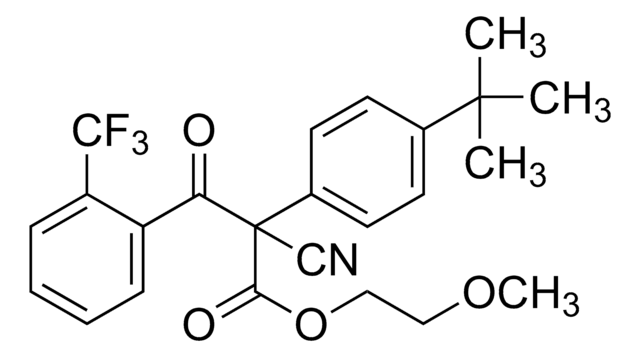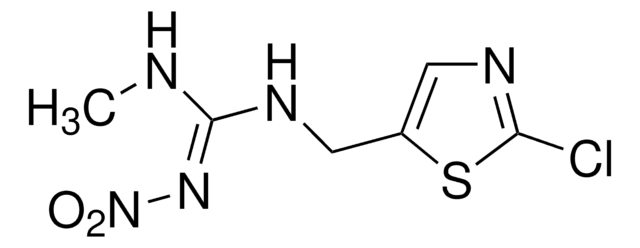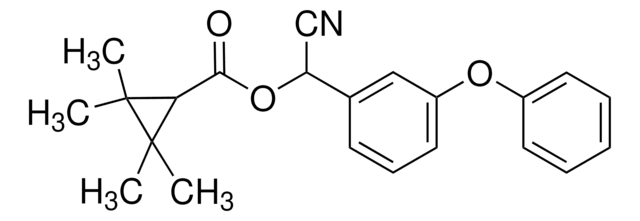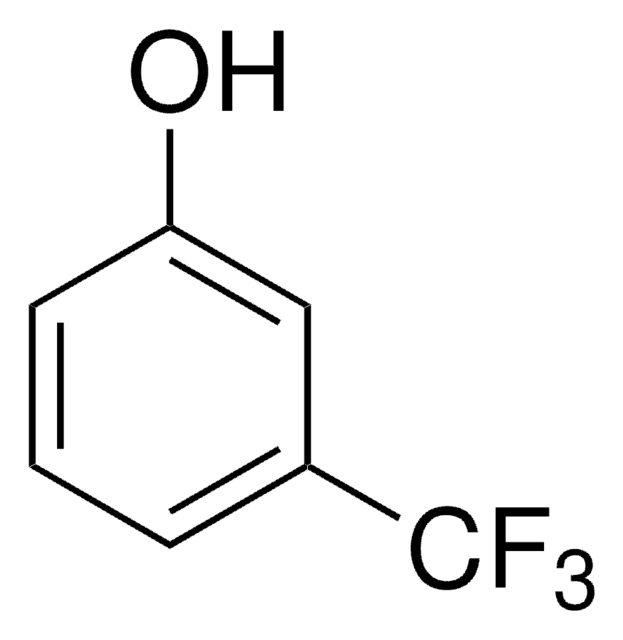CRM01303
Cyantraniliprole
certified reference material, TraceCERT®, Manufactured by: Sigma-Aldrich Production GmbH, Switzerland
Synonyme(s) :
3-Bromo-1-(3-chloro-2-pyridyl)-4′-cyano-2′-methyl-6′-(methylcarbamoyl)pyrazole-5-carboxanilide
About This Item
Produits recommandés
Qualité
certified reference material
TraceCERT®
Niveau de qualité
Gamme de produits
TraceCERT®
Durée de conservation
limited shelf life, expiry date on the label
Fabricant/nom de marque
Manufactured by: Sigma-Aldrich Production GmbH, Switzerland
Température de stockage
−20°C
Chaîne SMILES
O=C(C1=CC(Br)=NN1C2=C(Cl)C=CC=N2)NC3=C(C(NC)=O)C=C(C#N)C=C3C
InChI
1S/C19H14BrClN6O2/c1-10-6-11(9-22)7-12(18(28)23-2)16(10)25-19(29)14-8-15(20)26-27(14)17-13(21)4-3-5-24-17/h3-8H,1-2H3,(H,23,28)(H,25,29)
Clé InChI
DVBUIBGJRQBEDP-UHFFFAOYSA-N
Vous recherchez des produits similaires ? Visite Guide de comparaison des produits
Catégories apparentées
Description générale
Certified content by quantitative NMR incl. uncertainty and expiry date are given on the certificate.
Download your certificate at: http://www.sigma-aldrich.com
Cyantraniliprole, a second-generation diamide insecticide, activates the ryanodine receptors of insects to cause the release of Ca2+ ions resulting in muscle paralysis and death of the insect. It shows ovicidal, larvicidal, and adulticide activity, depending upon the pest species. It is used for cereal crops and vegetables, such as rice, peanuts, corn, tomatoes, green onions, and cucumbers for protection against lepidopteran and coleopteran pests.
Cyantraniliprole is approved for use in the European Union. The maximum residue limits (MRL) for cyantraniliprole in food crops, as per EU regulations are in the range of 0.01-15 mg/kg. As per a request received for cyantraniliprole MRL modification by an evaluating member state (EMS) on 28th January 2015, the EFSA has proposed an MRL of 0.5 mg/kg in strawberries, 0.2 mg/kg in the crop groups “herbal infusions from roots” and “root and rhizome spices”, 0.04 mg/kg on beans without pods, 0.15 mg/kg on peas without pods, and 0.1 mg/kg in globe artichokes. No MRL modifications were made for cherries, carrots, root and tuber vegetables, and brussels sprouts. Cyanantraniliprole is monitored in the Multiannual Control Programmes for Pesticides Residues (MACP), run within the EU and EFTA in/on products of plant origin.
Application
Cyantraniliprole certified reference material (CRM) may also find following use:
- Study of DNA damage, oxidative stress, and biological toxicity caused in earthworm by cyantraniliprole
- Development of an isotope-labelled internal standard based method using ultra-high-performance liquid chromatography-tandem mass spectrometry for the analysis of chlorantraniliprole and cyantraniliprole in fruits, vegetables, and cereals
- Simultaneous determination of 8 new generation amide insecticides by ultrahigh performance liquid chromatography-tandem mass spectrometry in complex food matrices
- Estimation of five diamide insecticides using carbon nanotube multiplug filter for sample clean-up and ultrahigh-performance liquid chromatography-tandem mass spectrometry in food matrices
- Simultaneous analysis of five diamide insecticides in edible mushrooms by high-performance liquid chromatography coupled to tandem mass spectrometry (HPLC-MS/MS) and a modified QuEChERS procedure for extraction
Produits recommandés
Informations légales
Mention d'avertissement
Warning
Mentions de danger
Conseils de prudence
Classification des risques
Aquatic Acute 1 - Aquatic Chronic 1
Code de la classe de stockage
11 - Combustible Solids
Classe de danger pour l'eau (WGK)
WGK 3
Point d'éclair (°F)
Not applicable
Point d'éclair (°C)
Not applicable
Faites votre choix parmi les versions les plus récentes :
Certificats d'analyse (COA)
Vous ne trouvez pas la bonne version ?
Si vous avez besoin d'une version particulière, vous pouvez rechercher un certificat spécifique par le numéro de lot.
Déjà en possession de ce produit ?
Retrouvez la documentation relative aux produits que vous avez récemment achetés dans la Bibliothèque de documents.
Notre équipe de scientifiques dispose d'une expérience dans tous les secteurs de la recherche, notamment en sciences de la vie, science des matériaux, synthèse chimique, chromatographie, analyse et dans de nombreux autres domaines..
Contacter notre Service technique







